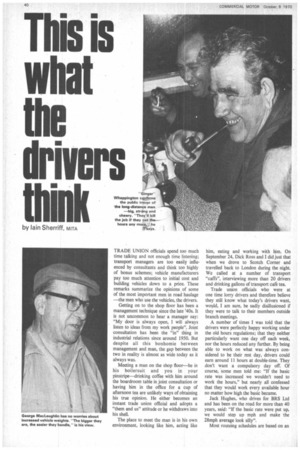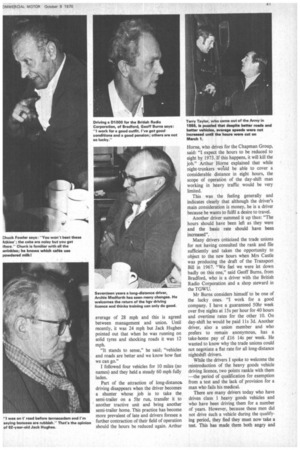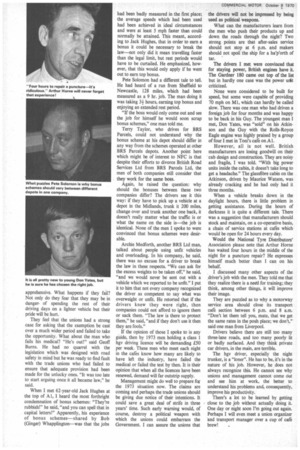This is
Page 42

Page 43

Page 44

If you've noticed an error in this article please click here to report it so we can fix it.
what
the drivers thin
by lain Sherriff, MITA
TRADE UNION officials spend too much time talking and not enough time listening; transport managers are too easily influenced by consultants and think too highly of bonus schemes; vehicle manufacturers pay too much attention to initial cost and building vehicles down to a price. These remarks summarize the opinions of some of the most important men in road haulage —the men who use the vehicles, the drivers.
Getting on to the shop floor has been a management technique since the late '40s. It is not uncommon to hear a manager say: "My door is always open, I will always listen to ideas from my work people". Joint consultation has been the "in" thing in industrial relations since around 1950. But despite all this bonhomie between management and man, the gap between the two in reality is almost as wide today as it always was.
Meeting a man on the shop floor—he in his boilersuit and you in your pinstripe—drinking coffee with him around the boardroom table in joint consultation or having him in the office for a cup of afternoon tea are unlikely ways of obtaining his true opinion. He either becomes an instant trade union official and adopts a "them and us" attitude or he withdraws into his shell.
The place to meet the man is in his own environment, looking like him, acting like him, eating and working with him. On September 24, Dick Ross and I did just that when we drove to Scotch Corner and travelled back to London during the night. We called at a number of transport "coifs", interviewing more than 20 drivers and drinking gallons of transport cafe tea.
Trade union officials who were at one time lorry drivers and therefore believe they still know what today's drivers want, would, I am sure, be sadly disillusioned if they were to talk to their members outside branch meetings.
A number of times I was told that the drivers were perfectly happy working under the old hours regulations; that they neither particularly want one day off each week, nor the hours reduced any further. By being able to work on what was always considered to be their rest day, drivers could earn around 11 hours at double-time. They don't want a compulsory day off. Of course, some men told me: "If the basic rate was increased we wouldn't need to work the hours," but nearly all confessed that they would work every available hour no matter how high the basic became.
Jack Hughes, who drives for BRS Ltd and has been on the road for more than 40 years, said: "If the basic rate were put up, we would step up mph and make the 28mph average look silly".
Most routeing schedules are based on an average of 28 mph and this is agreed between management and union. Until recently, it was 24 mph but Jack Hughes pointed out that when he was running on solid tyres and shocking roads it was 12 mph.
"It stands to sense," he said; "vehicles and roads are better and we know how fast we can go."
I followed four vehicles for 10 miles (no names) and they held a steady 60 mph fully laden.
Part of the attraction of long-distance. driving disappears when the driver becomes a shunter whose job is to take the semi-trailer on a 5hr run, transfer it to another tractive unit and bring another semi-trailer home. This practice has become more prevalent of late and drivers foresee a further contraction of their field of operation should the hours be reduced again. Arthur Horne, who drives for the Chapman Group, said: "I expect the hours to be reduced to eight by 1973. If this happens, it will kill the job." Arthur Horne explained that while night-trunkers weld be able to cover a considerable distance in eight hours, the scope of operation of the day-shift man working in heavy traffic would be very limited.
This was the feeling generally and indicates clearly that although the driver's main consideration is money, he is a driver because he wants to fulfil a desire to travel.
Another driver summed it up thus: "The hours should have been left as they were and the basic rate should have been increased".
Many drivers criticized the trade unions for not having consulted the rank and file sufficiently and taken the opportunity to object to the new hours when Mrs Castle was producing the draft of the Transport Bill in 1967. "We feel we were let down badly on this one," said Geoff Burns, from Bradford, who is a driver with the British Radio Corporation and a shop steward in the TGWU.
Mr Burns considers himself to be one of the lucky ones. "I work for a good company. I have a guaranteed 50hr week over five nights at 15s per hour for 40 hours and overtime rates for the other 10. On day-shift he would be paid 1 ls 3d. Another driver, also a union member and who prefers to remain anonymous, has a take-home pay of £16 14s per week. He wanted to know why the trade unions could not negotiate a flat rate for all long-distance nightshift drivers.
While the drivers I spoke to welcome the reintroduction of the heavy goods vehicle driving licence, two points rankle with them —the period of qualification for exemption from a test and the lack of provision for a man who fails his medical.
There are many drivers today who have driven class 1 heavy goods vehicles and who have been driving them for a number of years. However, because these men did not drive such a vehicle during the qualifying period, they find they must now take a test. This has made them both angry and
apprehensive. What happens if they fall? Not only do they fear that they may be in danger. of spending the rest of their driving days on a lighter vehicle but their pride will be hurt.
They feel that the unions had a strong case for asking that the exemption be cast over a much wider period and failed to take the opportunity. What about the man who fails his medical? "He's out!" said Geoff Burns. He had no quarrel with the legislation which was designed with road safety in mind but he was ready to find fault with the trade unions who had failed to ensure that adequate provision had been made for the unlucky ones. "It was too late to start arguing once it all became law," he said.
When I met 62-year-old Jack Hughes at the top of Al, I heard the most forthright condemnation of bonus schemes: "They're rubbish!" he said, "and you can spell that in capital letters!" Apparently, his experience of bonus schemes—shared by Bob (Ginger) Whapplington—was that the jobs had been badly measured in the first place; the average speeds which had been used had been achieved in ideal circumstances and were at least 5 mph faster than could normally be attained. This meant, according to Jack Hughes, that in order to earn a bonus it could be necessary to break the law—not only did it mean travelling faster than the legal limit, but rest periods would have to be curtailed. He emphasized, however, that this would only apply if he went out to earn top bonus.
Pete Solomon had a different tale to tell. He had heard of a run from Sheffield to Newcastle, 128 miles, which had been measured as a 9 hr. job. The man doing it was taking 3+ hours, earning top bonus and enjoying an extended rest period.
"If the boss would only come out and see the job for himself he would soon scrap bonus schemes," one man told me.
Terry Taylor, who drives for BRS Parcels, could not understand why the bonus scheme at his depot should differ in any way from the schemes operated at other BRS Parcels depots. Another point here which might be of interest to NFC is that despite their efforts to divorce British Road Services Ltd from BRS Parcels Ltd, the men of both companies still consider that they work for the same boss.
Again, he raised the question: why should the bonuses between these two companies differ? The drivers see it this way: if they have to pick up a vehicle at a depot in the Midlands, trunk it 200 miles, change over and trunk another one back, it doesn't really matter what the traffic is or what the name on the side is—the job is identical. None of the men I spoke to were convinced that bonus schemes were desirable.
Archie Medforth, another BRS Ltd man, talked about people using unfit vehicles and overloading. In his company, he said, there was no excuse for a driver to break the law in these respects. "We can ask for the excess weights to be taken off," he said, "and we would never be sent out with a vehicle which we reported to be unfit." I put it to him that not every company recognized the driver as competent to say what was overweight or unfit. He retorted that if the drivers knew they were right, then companies could not afford to ignore them or sack them. "The law is there to protect them," he said, "and if they don't use it then they are fools."
If the opinion of those I spoke to is any guide, then by 1973 men holding a class 1 hgv driving licence will be demanding £50 per week. These men who meet each night in the cafes know how many are likely to have left the industry, have failed the medical or failed the test by then. It is their opinion that when all the licences have been renewed, demand will far outstrip supply.
Management might do well to prepare for the 1973 situation now. The claims are coming and perhaps the trade unions should be giving due notice of their intentions. It could save a great deal of strife in three years' time. Such early warning would, of course, destroy a political weapon with which the unions could embarrass the Government. 1 can assure the unions that
the drivers will not be impressed by being used as political weapons.
What can the manufacturers learn from the men who push their products up and down the roads through the night? Two strong points are that after-sales service should not stop at 6 p.m. and makers should not spoil the ship for a ha'p'orth of tar.
The drivers I met were convinced that for staying power, British engines have it. The Gardner 180 came out top of the list but in hardly one case was the power wit criticized.
None were considered to be built for speed, but some were capable of providing 70 mph on MI, which can hardly be called slow. There was one man who had driven a foreign job for four months and was happy to be back in his Guy. The youngest man I met, Don Yates, was "sold" on his Atkinson and the Guy with the Rolls-Royce Eagle engine was highly praised by a group of four I met in Tord's cafe on Al.
However, all is not well. British manufacturers are losing goodwill on their cab design and construction. They are noisy and fragile, I was told. "With big power units inside the cabin, it doesn't take long to get a headache." The glassfibre cabin on the Atkinson, driven by Maurice Watson, was already cracking and he had only had it three months.
When a vehicle breaks down in the daylight hours, there is little problem in getting assistance. During the hours of darkness it is quite a different tale. There was a suggestion that manufacturers should stock and maintain, on a co-operative basis, a chain of service stations at cafes which would be open for 24 hours every day.
Would the National Tyre Distributors' Association please note that Arthur Home has waited four hours in the middle of the night for a puncture repair? He expresses himself much better than I can on his behalf.
I discussed many other aspects of the driver's job with the men. They told me that they realize there is a need for training; they think, among other things, it will improve their image.
They are puzzled as to why a motorway service area should close its transport care section between 6 p.m. and 8 a.m. "Don't let them tell you, mate, that we get the same rates in the posh place; we don't," said one man from Liverpool.
Drivers believe there are still too many three-lane roads, and too many poorly lit or badly surfaced. And they think private car drivers, in the main, are terrible.
The hgv driver, especially the night trunker, is a "loner". He has to be, it's in the nature of his job. However, he does not always recognize this. He cannot see why unions and management cannot come out and see him at work, the better to understand his problems and, consequently, improve his productivity.
There's a lot to be learned by getting close to the job without actually doing it. One day or night soon I'm going out again. Perhaps I will even meet a union organizer 'and transport manager over a cup of care brew








































































































